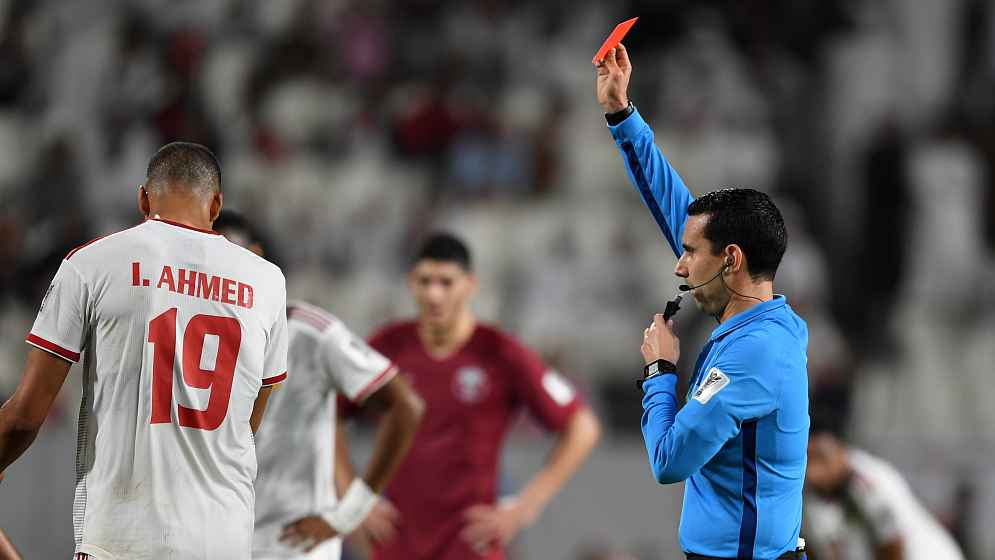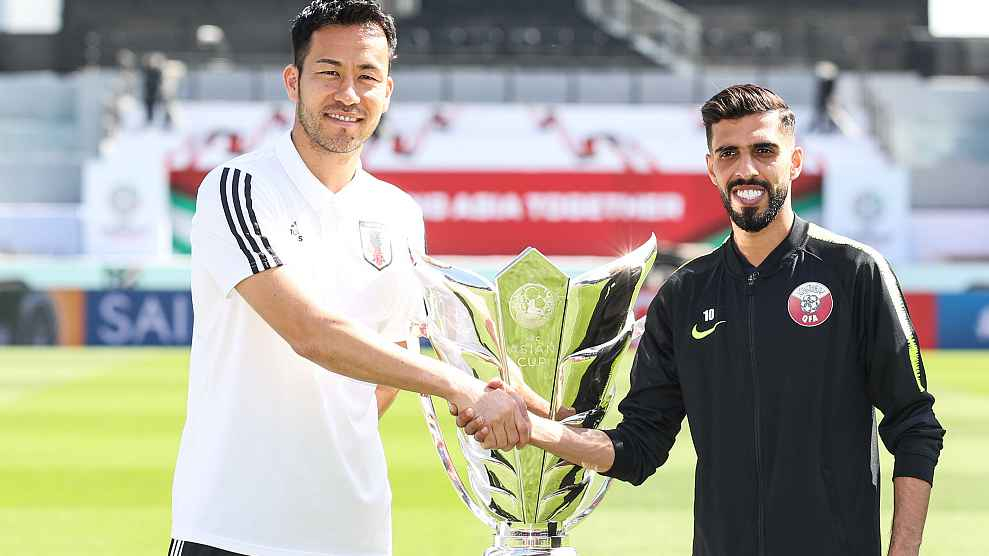
Soccer
08:42, 01-Feb-2019
AFC rejects UAE protest over eligibility of Qatari players
Updated
21:52, 01-Feb-2019
CGTN

The Asian Football Confederation (AFC) on Friday rejected the protest of the United Arab Emirates (UAE) over the eligibility of Qatari players that played in the 2019 AFC Asian Cup.
"The Asian Football Confederation (AFC) Disciplinary and Ethics Committee on Friday dismissed the protest lodged by the United Arab Emirates Football Association over the eligibility of two Qatar players," said AFC in a statement.
After being denied a spot in Friday's Asian Cup final by Qatar, the UAE launched the protest that carries political undertones.
The complaint added another layer to Qatar's politically-charged progress to the final of the continental soccer showpiece in the UAE, which is part of a quartet of countries boycotting Doha diplomatically and politically.
There was an angry reaction from the home crowd in Abu Dhabi on Tuesday as the UAE were routed in the semifinal, with shoes thrown at Qatari players after striker Almoez Ali scored the second goal in a 4-0 win.
The UAE soccer federation has now questioned whether Ali, with a tournament-leading eight goals and Bassam Al-Rawi meet FIFA's nationality requirements to play for the 2022 World Cup host nation having been born outside Qatar. Al-Rawi was suspended for the semifinal because of bookings but is in line to play in the final.

Japan captain Yoshida Maya (L) and Qatar skipper Hasan Al Haydos attend the Asian Cup Trophy Photo Session at Zayed Sports City Stadium, January 31, 2019. /VCG Photo
Japan captain Yoshida Maya (L) and Qatar skipper Hasan Al Haydos attend the Asian Cup Trophy Photo Session at Zayed Sports City Stadium, January 31, 2019. /VCG Photo
The ultimate sanction would have seen Qatar having to forfeit the match as a 3-0 loss, according to AFC rules, and disqualification from playing Japan on Friday in the final.
Players can feature for the national team other than your birthplace if you comply with FIFA's requirements. Those include having a biological parent or grandparent born in the country or having lived continuously for at least five years in the country after the age of 18.
The 21-year-old Al-Rawi, who also played for Qatar at the Under-21 World Cup in 2015, is the son of a former Iraq international. The 22-year-old Ali is widely listed to have been born in Sudan, but that could not immediately be verified.
By winning the hosting rights for the 2022 World Cup in 2010, Qatar have had a long time to try to find the players to ensure it has a competitive team. The team's ranking has fluctuated between No. 78 and No. 112 in the last decade and never managed to qualify for a World Cup.
Both Ali and Al-Rawi are graduates of the state-of-the-art Aspire training academy in Doha that has been used to develop young talents, many of which were born outside Qatar, a nation of only about 330,000 citizens.
FIFA referred all comments to the AFC. Qatar team spokesman Ali Salat did not reply to messages about the eligibility questions over players. Coach Felix Sanchez at the news conference ahead of the final only said he was “not concerned at all.”
'Biggest achievement'
With Qatar having a point to prove about its footballing ability, Sanchez was more willing to talk about the landmark of the small Gulf nation contesting a first-ever Asian Cup final.
″(If) we get a result that gives us the trophy, of course, this will be the biggest achievement in the (country's) football history,” Sanchez said. “It will mean that a lot of things have been done in the right way. In the last years, this group of players worked in the right direction with the right mentality to be in the top of the competition.
″(It) doesn't matter what happens tomorrow, we are feeling very proud about them, because they are showing very high level in this competition playing against top teams. So, we are going to try to make people in our country tomorrow happy again and try to make history.”
Victory would perhaps be all the sweeter for the Qataris coming in one of the nations that have severed all ties with them over accusations they support extremist groups. Qatar denies any backing of terror groups.
Having blocked off direct travel to Qatar since June 2017, the UAE made no exemptions even to smooth the journey of the country's Asian Cup team. Qatar had to take a circuitous route via Kuwait lasting more than five hours to make an air journey that can be done directly in around an hour.
Source(s): AP

SITEMAP
Copyright © 2018 CGTN. Beijing ICP prepared NO.16065310-3
Copyright © 2018 CGTN. Beijing ICP prepared NO.16065310-3